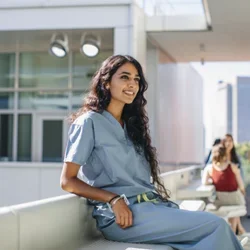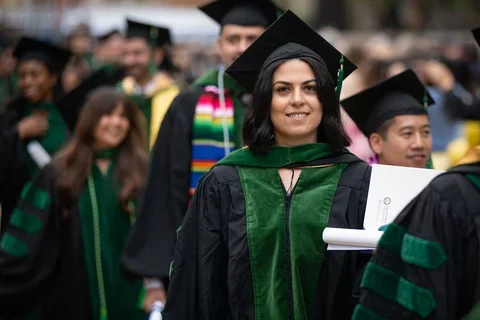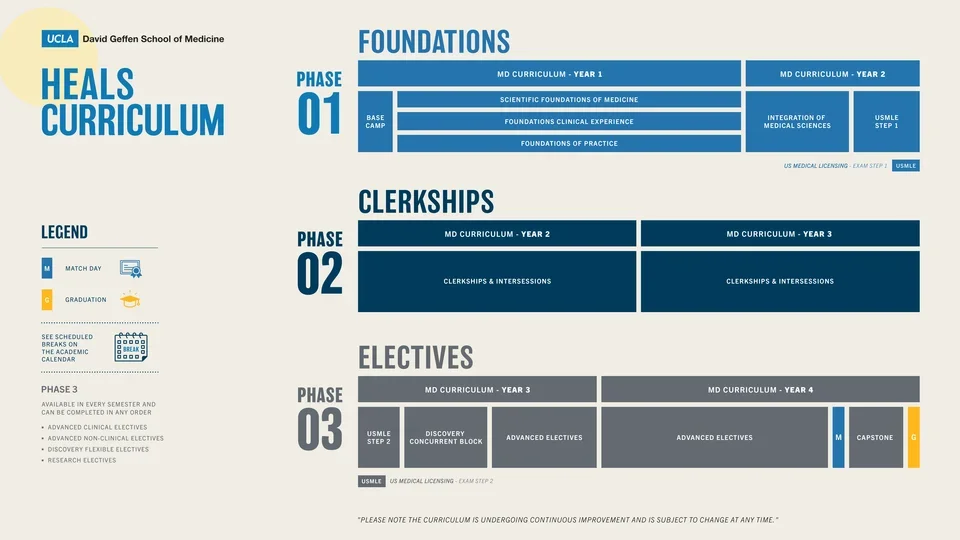HEALS Curriculum
A New Medical School Curriculum for a New Age
Healer | Educator | Advocate | Leader | Scholar
A Dynamic Medical Educational Program
The HEALS medical school curriculum at the David Geffen School of Medicine (DGSOM) at UCLA represents a transformative approach to training future physicians. Designed to evolve alongside modern advances in science and medicine, the curriculum blends early clinical experience, interdisciplinary education, interprofessional education, and research to create physician leaders of the future.
View the MD Academic CalendarView the HEALS Curriculum Schematic
What Makes the HEALS Curriculum Unique?
The HEALS medical school curriculum transforms the traditional medical education model of two years of basic science followed by two years of clinical practice into a three-phase approach. Key features of this new curriculum include early authentic clinical experiences throughout the first phase, integration of new and emerging content, earlier clinical rotations, and the blending of basic science instruction with clinical practice. Additionally, dedicated time is provided for students to pursue research, electives, advocacy, and other interests.

Key Features of the HEALS Medical School Curriculum
- A competency-based curriculum that brings together medical educators from all years of the program, fostering collaboration and ensuring a cohesive and comprehensive learning experience.
- Deliberate developmental sequencing of important content areas or “threads” across the curriculum
- Longitudinal coaching by some of our very best teaching faculty (Educators for Excellence) to assist students in their professional skill development.
- Integrating basic science instruction with hands-on clinical practice, creating a dynamic and immersive learning experience that bridges theory and real-world application.
- Research-based Discovery opportunities that emphasize lifelong learning and scholarship in both clinical and community settings.
- Earlier entry into clinical clerkships and advanced clinical electives to enhance career exploration and increase competitiveness for residency selection, complemented by early clinical experiences in the first phase of medical school.
- Interprofessional Education fostering essential partnerships among educators, students, and professionals from various fields to simulate the collaborative-care environments students will experience in their medical careers.
The Doctor of Medicine (MD) curriculum focuses on team-based collaborative learning, with a strong emphasis on applying knowledge through hands-on experiences in clinical and community settings.
Phases of the HEALS Medical School Curriculum
Your UCLA Journey
Phase 1
The curriculum focuses on case-based learning to encourage students to think like physicians from Day 1. This phase combines basic and clinical sciences, early clinical medicine experiences, and all thread areas.
Phase 2
Phase 2 encompasses a year of clinical rotations, featuring clerkships and educational experiences that blend clinical care, basic science, thread areas, and many new and emerging topics.
Phase 3
The final stretch to being a physician leader and more. Phase 3 is dedicated to a deep creative and scholarly experience, as well as specialty-specific competency development and internship preparation.
HEALS Course Objectives
Required Course Objectives
Discover our specific course objectives. Guided by national standards and crafted by our expert faculty.

Our Program Objectives
Medical Student HandbookHEALS Curriculum Schematic
Explore a visual representation of the HEALS curriculum in our schematic
